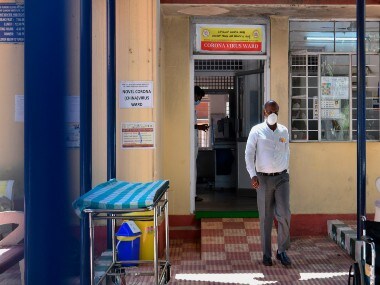Late March 17, West Bengal joined the list of states with confirmed cases of novel coronavirus infection. The patient in Kolkata took the total number of cases in India to 147 and the number of affected states to 16. Of the 147 cases in India, 14 have recovered so far while three have died of the infection. The Ministry of Health and Family Welfare has added a national toll-free helpline (number 1075) to address queries about the infection. Local numbers that people can call in their respective states for information are also available on the health ministry website. [caption id=“attachment_8010881” align=“alignleft” width=“380”]  Representational image. Image source: Getty Images.[/caption] Maharashtra, which has the maximum number of confirmed cases in India, is set to get seven more testing facility, according to state Health Minister Rajesh Tope. Noida in the National Capital Region has meanwhile confirmed its fourth case of infection - the first person to get COVID-19 infection in Noida had recently travelled back from Indonesia. Globally, the death toll is nearing 8,000. The total number of confirmed cases is almost 200,000. The novel coronavirus - called SARS-CoV-2 - originated in Wuhan, China late last year and has spread to 159 countries all over the world. While many countries are still reporting under 10 cases, the death toll in Italy and Iran combined has crossed the death toll in China.
Measures of containment
The Indian government released a social distancing advisory, suggesting people limit their social contact as much as possible as a means to eventually decrease the spread and mortality of the disease. Government suggestions include the closure of schools, universities, gyms, theatres, museums, etc., the postponement of exams, work from home wherever possible, video conferencing instead of meetings and limiting the size of gatherings at weddings, markets, religious and sporting events. Non-essential travel should be avoided and one should try to maintain a distance of 1 meter even while travelling in public transport. While there is a noticeable decline in footfall, some of the measures aren’t realistic for people travelling on popular routes in metro cities. Buses and metros are being sanitized at the end of every day but come morning, some of them are still filled to capacity, with hardly 1 cm between two people. With the further spread of the infection, we may see the state governments employing stricter restrictions when it comes to self-isolation. Europe may still be the epicentre but there is a noted surge in confirmed cases in Southeast Asia (the World Health Organization clubs South Asia and Southeast Asia together for health models). Malaysia, after recording the highest number of cases in Southeast Asia, has introduced some of the strongest restriction for a 14-day-period of isolation, beginning today, March 18. The WHO, along with the United Nations Foundation and Swiss Philanthropy Foundation, has set up a COVID-19 Solidarity Response Fund which will be accepting donations from individuals, corporations and institutions all over the world. The funds collected will be used to help countries, especially the ones that have a weaker healthcare system, control and respond to the spread of the infection.
Community infection news
The situation is dire, with some countries claiming they’re at war. But here’s something to lift your spirits by a fraction: the Indian Council of Medical Research collected 1,020 samples from all over India to check for community transmission. The results of half of those are back and suggest no community transmission so far. The remaining results are expected back today. That said, 1,020 is a comparatively small number. The curbs employed in China during the peak of the pandemic have resulted in a significant decrease in pollution levels in the country. A Stanford University researcher, Marshall Burke, said that this might have saved a lot more lives than the ones lost to the novel coronavirus. The lockdown in Italy has led to the canals of Venice being cleaner than they have been in a long time. Social media is abuzz with how pollution and tourism had resulted in the water being dirty and contaminated but with the streets clear of people, wildlife like large fish and swan have returned. For more tips, read our article on Coronavirus_._ Health articles in Firstpost are written by myUpchar.com, India’s first and biggest resource for verified medical information. At myUpchar, researchers and journalists work with doctors to bring you information on all things health.


)

)
)
)
)
)
)
)
)



